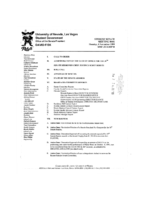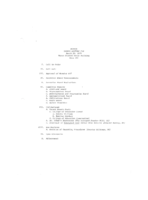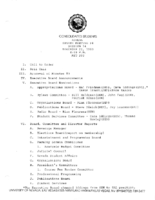Search the Special Collections and Archives Portal
Search Results

Meeting minutes for Consolidated Student Senate, University of Nevada, Las Vegas, March 08, 2004
Date
Archival Collection
Description
Text

Meeting minutes for Consolidated Student Senate, University of Nevada, Las Vegas, November 08, 1999
Date
Archival Collection
Description
Text

Meeting minutes for Consolidated Student Senate, University of Nevada, Las Vegas, March 20, 1979
Date
Archival Collection
Description
Text

Meeting minutes for Consolidated Student Senate University of Nevada, Las Vegas, March 14, 1985
Date
Archival Collection
Description
Text

Meeting minutes for Consolidated Student Senate, University of Nevada, Las Vegas, November 22 1983
Date
Archival Collection
Description
Text

Meeting minutes for Consolidated Student Senate, University of Nevada, Las Vegas, January 3, 1984
Date
Archival Collection
Description
Text

Transcript of interview with Nora Luna by Maribel Estrada Calderón, November 7, 2018
Date
Archival Collection
Description
Nora Luna (1971 - ), the daughter of Mexican immigrants, recalls her growing up experience in the Las Vegas Valley. During her childhood, she and her siblings frequently persuaded their father to take them out to eat to the Circus Circus buffet. She enjoyed playing the carnival games at the Circus Circus. She attended Las Vegas High School. In 1994, she graduated from UNLV with a degree in criminal justice. Her education inspired her to work with the community’s youth. She tutored children at the Y.M.C.A. of Southern Nevada. Luna also worked for a program, Anahuac, which sought to deconstruct some of the myths that often prevent Latinos from attending college. In Reno, Nevada she worked with non-profit organizations to implement evidence-based practices for youth development. Luna has worked for Nathan Adelson Hospice as the Director of Diversity and Grant Funding since 2008. She seeks to find culturally competent care for Latinos and ensures that the hospice provides informational r
Text
Barbara Agonia oral history interviews
Identifier
Abstract
Oral history interviews with Barbara Agonia conducted by Suzanne Becker on September 17, 2007, September 25, 2007, and October 02, 2007 for the Women's Research Institute of Nevada (WRIN) Las Vegas Women Oral History Project. Agonia's interviews begin with an overview of her early life, including her education and study abroad experiences in England during college. During the interview Agonia also discusses attending the University of Nevada, Las Vegas in the 1950s for graduate school. Agonia talks about her community activism with Soroptimist International of Las Vegas, Friends of the Nevada Wildnerness, and Clark County Community College. Lastly, Agonia discusses advocacy initiatives for Great Basin National Park and rape crisis education.
Archival Collection

Francisco Aguilar interview, April 19, 2019: transcript
Date
Description
Interviewed by Monserrath Hernández. Francisco 'Cisco' Aguilar is a lawyer and the Founding Chairman of the Cristo Rey St. Viator College Preparatory High School. He talks about growing up in Tucson, Arizona in a Mexican household and continuing his passions to engage in social change as a lawyer. His career and community engagement led him to become a lobbyist, a fellow in Germany, and serve on various committees such as the Catholic Charities Board, Opportunity 180 Board, and the Nevada Athletic Commission. His oral history demonstrates his dedication to providing a future to the Latinx youth of Las Vegas.
Text

Transcript of interview with William Carlson by Alice Brown, March 19, 1980
Date
Archival Collection
Description
Text
